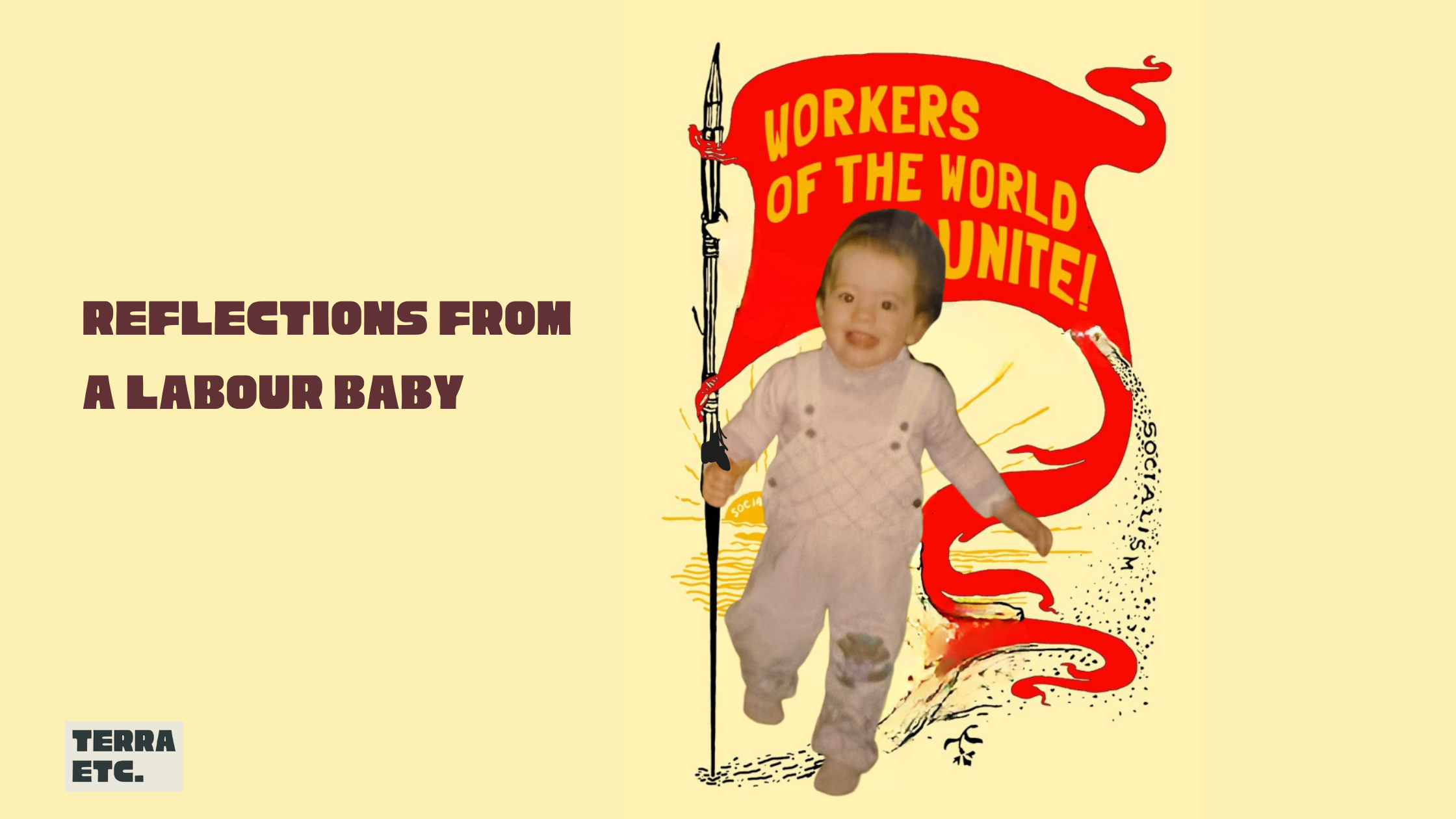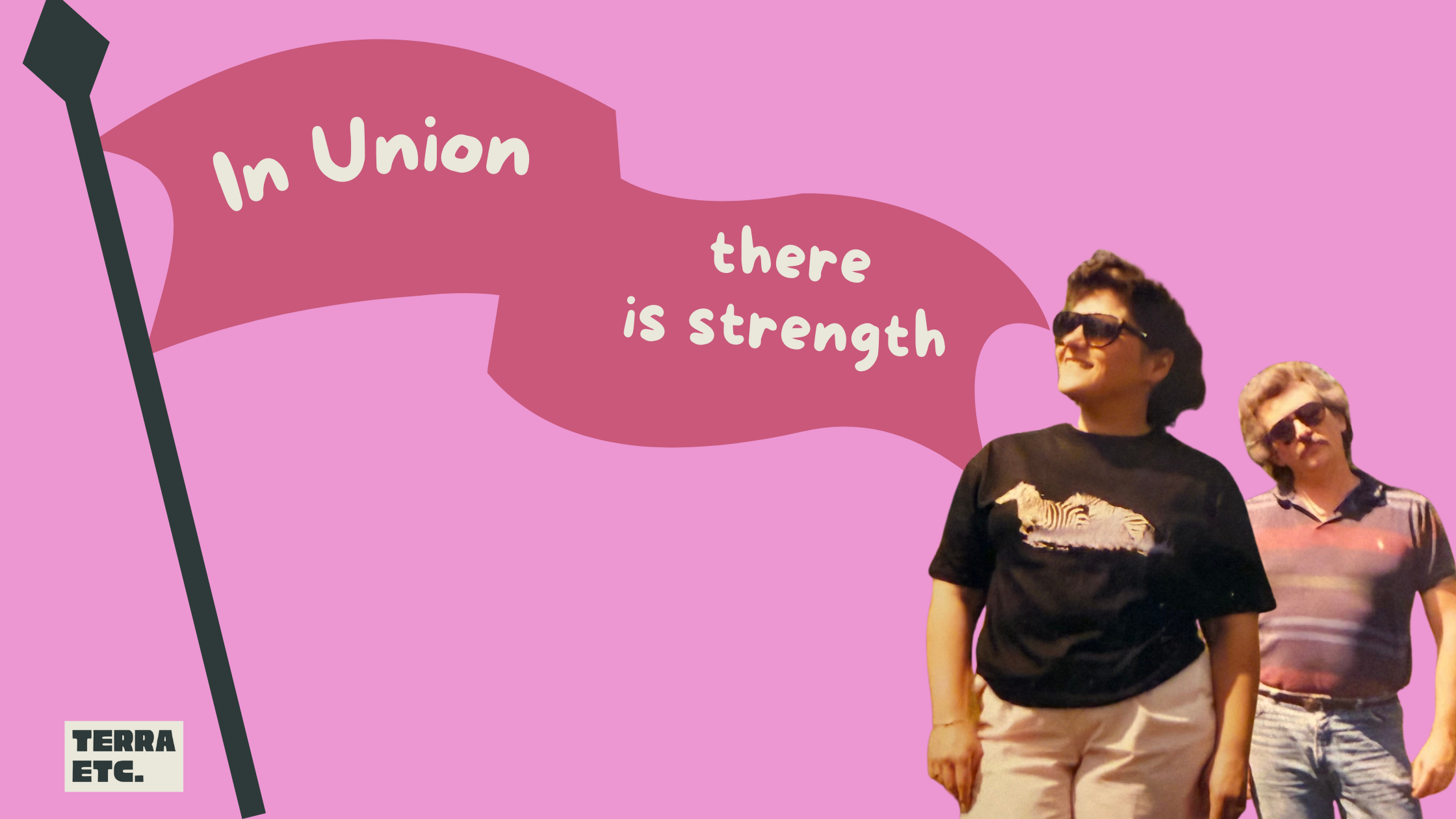Reflections of a Labour Baby
Fun fact about me: I was born on Labour Day.
This timing feels more significant with each passing year. As I've been reflecting on my own relationship to labour movements, capitalism, and community care, I keep coming back to the lessons my parents unknowingly taught me about what work should—and shouldn't—be.
These reflections have shaped not just my worldview, but how I approach my own work today. They're why I created Tools for Solidarity—free resources designed to support social impact professionals, nonprofit workers, grassroots fundraisers, community organizers, and advocates who are building something better than what capitalism offers us.
Two Models of Union Life
What does it mean to grow up in a "union household"? Both my parents were unionized, but they showed me two very different relationships with organized labor.
My mother—a civil servant during the Harris era—was deeply involved. They took me to picket lines, water plant tours, and made sure I got first aid training as soon as I was old enough. For them, union membership meant civic engagement and community responsibility.
My dad? He was a unionized bar manager who never attended a single meeting. But here's the thing—that stable union job gave them the freedom to be an artist. No "bringing work home," no fear of arbitrary firing. They could pursue their creative work knowing their day job was secure.
I inherited my mom's activist spirit, but I deeply understand my dad's approach too. In both instances the union didn't just protect their jobs—it protected their humanity.
That kind of worker security has been systematically eroded over decades. The fear of being fired "for no good reason at any moment" now defines most people's work lives. That's not normal. And it's absolutely worth fighting for.
Democracy as Practice
At ten years old, I made my newspaper debut. Not for science fair wins or ballet recitals—but for being crammed into an overcrowded, underfunded school.
While other kids complained about homework, I was frequenting school board meetings. My mom never told me what to think, but they made sure I saw how decisions got made (and who got left out).
This pattern continued: Earth Day events, fighting polluting power plants, volunteering for causes even as a moody tween. I learned that democracy isn't something that happens TO you—it's something you DO.
When my mom died in 2003, their community work came full circle. Free childcare. Hot meals. Transportation. Hospice volunteers. A network of care that held our family together during the worst possible time.
My parents had moved to Innisfil as outsiders with no existing ties. But they understood something crucial: community isn't inherited—it's built through practice, contribution, and mutual aid.
This shapes everything about how I work today. Because in a world designed to isolate us, community care isn't just nice to have. It's revolutionary.
Bread and Roses
"We want bread, and roses too."
That 1912 strike slogan captures everything my dad understood about work—even if they never said it that way. While my mom was the vocal activist, my dad practiced something equally radical: they refused to let work consume their identity.
As a unionized bar manager, they showed up, did their job well, and then... left. No "networking." No "side hustles." No bringing work stress home to their family. Instead, they spent evenings painting. Weekends creating art. Time thinking freely instead of strategizing for their employer's profit.
This wasn't laziness—this was resistance.
In a culture that preaches "passion for your job" and "always be hustling," my dad's approach was quietly revolutionary. They understood that when work becomes your whole identity, you stop being a full human being. You become a resource to be optimized.
We've been sold this lie that meaningful work should fulfill all our needs. But what if the most meaningful thing about work is having the security to stop doing it at 5pm? What if "work-life balance" isn't about fitting more into your schedule—but about creating space for your mind to wander, question, and imagine freely?
My dad got their roses. And in a world designed to steal our time and thoughts, that's the most radical thing of all. Bread feeds the body. Roses feed the soul. Workers deserve both.
The Movement Isn't Perfect
"Your heart is a muscle, the size of your fist. Keep on loving, keep on fighting." - Dalia Shevin
Here's what I need to say: the labour movement isn't perfect. It has let me down. More than once. I've watched it shut out voices that desperately needed to be heard—often the very people most exploited by our economic system.
Traditional unions have historically excluded marginalized workers. Many still struggle with racism, ableism, and other forms of oppression that capitalism depends on to divide us.
But here's what my parents gave me that matters most: From my mom: curiosity that never stops asking "why" and "what if we tried this instead?" From my dad: the independence to step back, think critically, and refuse to let any job consume my whole identity.
I'm not just their legacy—I'm my own person entirely. My work and life are influenced by countless people fighting systems of oppression in ways traditional labor organizing never could.
The only way forward is growth. Leading with heart and compassion. Recognizing that our fights are interconnected, and that love—not just anger—must drive our resistance.
Tools for the Work Ahead
This Labour Day, I'm thinking about what it means to live these values in practice. That's why I started Tools for Solidarity—free resources designed with communities in mind, not corporations.
The tools I'm sharing include:
Mission Ready: A project management guide created with Zahra Datoo that centers justice and sustainability over extraction
Field Notes for Movement Messaging: A toolkit grounded in lived experience and anti-capitalist strategy for organizers and advocates
Spotting Astroturf: A hands-on guide to identify and push back against fake grassroots campaigns
Ethical Fundraising Decision Tree: A values-driven tool to help nonprofits and mutual aid groups navigate funding decisions with integrity
Each resource is built to help navigate the complexities of raising money, building power, and advancing justice—without losing our humanity in the process. And more are in the works.
My heart really is a muscle. It's grown stronger through disappointment, more flexible through learning, more powerful through connection with people the movement sometimes forgot.
Keep on loving. Keep on fighting. But keep on growing too.
That's what being a labour baby taught me.
Access all free Tools for Solidarity resources at terraloire.com/tools-for-solidarity


